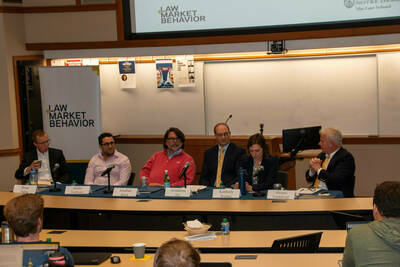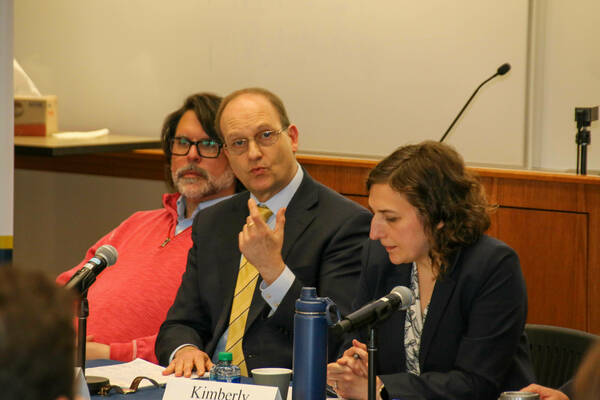Notre Dame Law School Hosts Symposium on Assessing Regulatory Instruments of Behavior Change in Energy Conservation

The Law School’s Program on Law and Economics and the Notre Dame Research Program on Law and Market Behavior jointly hosted a Symposium on “Assessing Regulatory Instruments of Behavior Change: Lessons from Energy Conservation” on April 12 at Notre Dame Law School.
The symposium was organized and moderated by Avishalom Tor, Professor of Law at Notre Dame Law School and Director of the Notre Dame Research Program on Law and Market Behavior.
The panelists included:
-
Dmitry Taubinsky, Associate Professor of Economics at UC-Berkeley
-
Michael Vandenbergh, David Daniels Allen Distinguished Chair in Law and Director of the Climate Change Research Network at Vanderbilt Law School
-
Kimberly Wolske, Associate Professor of Public Policy at the University of Chicago Harris School of Public Policy and Fellow at the Energy Policy Institute at the University of Chicago
-
Jonathan Klick, Charles A. Heimbold, Jr. Professor of Law at the University of Pennsylvania Carey School of Law
-
Bruce Huber, Professor of Law at Notre Dame Law School.

The discussions centered around the potential, effectiveness, and normative evaluation of behavioral interventions aimed at encouraging household energy conservation (such as the ubiquitous use of Home Energy Reports). The diverse disciplinary backgrounds of the speakers provided for a rich discussion and debate that considered political behavior, individual psychology, and economic efficiency and welfare assessment.
The first part of the symposium featured presentations by Professors Wolske, Vandenbergh, and Taubinsky. They introduced various behavioral energy conservation interventions, discussed evidence of their effectiveness, emerging findings on whether and when such interventions can produce net benefits, and addressed the challenges associated with assessing them. Professors Klick and Huber provided further insights from the vantage points of energy policy and law and economics.
The latter part of the symposium included a moderated roundtable discussion, during which participants actively exchanged views, responded to each other's perspectives, and explored the broader legal policy implications of the earlier presentations and discussion.
Please see a video of the discussion here and the roundtable discussion and Q and A with the panelists here.